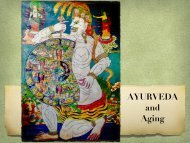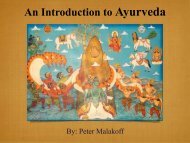How Thoreau's Walden Pond Mixed with the Ganges and Yoga Came to America with Swami Vivekananda
One early morning in 1846, during the coldest days of a New England winter, Henry David Thoreau looked out the window of his small cabin on Walden Pond and saw men cutting its ice into blocks. That ice was hauled by horse to a railroad that ran across the western edge of Walden Pond, packed into a boxcar, taken to Boston and loaded onto a clipper ship that sailed to Calcutta, India, arriving about four months later. Once there, that ice was purchased by grateful members of the East India Company. Thoreau had witnessed a small part of the global ice trade between New England and India that took place during the latter part of the nineteenth century. When Thoreau considered the ice trade, his vision sailed on metaphors far beyond the scope of business. The waters he imagined flowed both east and west and carried not just natural elements, but culture, religion and philosophy as well. He envisioned that after arriving in Calcutta, the New England ice of Walden Pond would eventually melt and run downhill where it would join with the sacred water of the Ganges. He wrote in Walden: "It appears that the sweltering inhabitants of Charleston and New Orleans, of Madras and Bombay and , drink at my well. In the morning I bathe my intellect in the stupendous and cosmogonal philosophy of the , since whose composition years of the gods have elapsed, and in comparison with which our modern world and its literature seem puny and trivial; and I doubt if that philosophy is not to be referred to a previous state of existence, so remote is its sublimity from our conceptions. I lay down the book [Bhagavad-Gita] and go to my well for water, and lo! there I meet the servant of the Bramin, priest of and and who still sits in his temple on the Ganges reading the , or dwells at the root of a tree with his crust and water jug. I meet his servant come to draw water for his master, and our buckets as it were grate together in the same well. The pure Walden water is mingled with the sacred water of the Ganges." This book tells the story of these waters . . .
One early morning in 1846, during the coldest days of a New England winter, Henry David Thoreau looked out the window of his small cabin on Walden Pond and saw men cutting its ice into blocks. That ice was hauled by horse to a railroad that ran across the western edge of Walden Pond, packed into a boxcar, taken to Boston and loaded onto a clipper ship that sailed to Calcutta, India, arriving about four months later. Once there, that ice was purchased by grateful members of the East India Company. Thoreau had witnessed a small part of the global ice trade between New England and India that took place during the latter part of the nineteenth century.
When Thoreau considered the ice trade, his vision sailed on metaphors far beyond the scope of business. The waters he imagined flowed both east and west and carried not just natural elements, but culture, religion and philosophy as well. He envisioned that after arriving in Calcutta, the New England ice of Walden Pond would eventually melt and run downhill where it would join with the sacred water of the Ganges. He wrote in Walden: "It appears that the sweltering inhabitants of Charleston and New Orleans, of Madras and Bombay and , drink at my well. In the morning I bathe my intellect in the stupendous and cosmogonal philosophy of the , since whose composition years of the gods have elapsed, and in comparison with which our modern world and its literature seem puny and trivial; and I doubt if that philosophy is not to be referred to a previous state of existence, so remote is its sublimity from our conceptions.
I lay down the book [Bhagavad-Gita] and go to my well for water, and lo! there I meet the servant of the Bramin, priest of and and who still sits in his temple on the Ganges reading the , or dwells at the root of a tree with his crust and water jug. I meet his servant come to draw water for his master, and our buckets as it were grate together in the same well. The pure Walden water is mingled with the sacred water of the Ganges."
This book tells the story of these waters . . .
Create successful ePaper yourself
Turn your PDF publications into a flip-book with our unique Google optimized e-Paper software.
Johnny Appleseed<br />
John Chapman (September 26, 1774 – March 11,<br />
1845), often called Johnny Appleseed, was an<br />
<strong>America</strong>n pioneer nurseryman who introduced apple<br />
trees <strong>to</strong> large parts of Pennsylvania, Ohio, Indiana,<br />
<strong>and</strong> Illinois, including <strong>the</strong> nor<strong>the</strong>rn counties<br />
of present day West Virginia. He became an <strong>America</strong>n<br />
legend while still alive, due <strong>to</strong> his kind, generous<br />
ways, his leadership in conservation, <strong>and</strong> <strong>the</strong><br />
symbolic importance he attributed <strong>to</strong> apples. He<br />
was also a missionary for The New Church (Swedenborgian)<br />
. . .<br />
(Swedenborg claimed <strong>to</strong> have received a new revelation<br />
from Jesus Christ through continuous heavenly<br />
visions which he experienced over a period of at<br />
least twenty-five years. In his writings, he predicted that God would replace <strong>the</strong><br />
traditional Christian Church, establishing a 'New Church', which would worship<br />
God in one person: Jesus Christ.)<br />
He would tell s<strong>to</strong>ries <strong>to</strong> children, spread <strong>the</strong> The New Church gospel <strong>to</strong> <strong>the</strong><br />
adults, receiving a floor <strong>to</strong> sleep on for <strong>the</strong> night, sometimes supper in return.<br />
"We can hear him read now, just as he did that summer day, when we were busy<br />
quilting upstairs, <strong>and</strong> he lay near <strong>the</strong> door, his voice rising denuncia<strong>to</strong>ry <strong>and</strong> thrillin—strong<br />
<strong>and</strong> loud as <strong>the</strong> roar of wind <strong>and</strong> waves, <strong>the</strong>n soft <strong>and</strong> soothing as<br />
<strong>the</strong> balmy airs that quivered <strong>the</strong> morning-glory leaves about his gray beard. His<br />
was a strange eloquence at times, <strong>and</strong> he was undoubtedly a man of genius," reported<br />
a lady who knew him in his later years.<br />
Chapman was quick <strong>to</strong> preach <strong>the</strong> Gospel as he traveled, <strong>and</strong> during his travels<br />
he converted many Indians, whom he admired. The Native <strong>America</strong>ns regarded<br />
him as someone who had been <strong>to</strong>uched by <strong>the</strong> Great Spirit, even hostile<br />
tribes left him strictly alone. He once wrote, "I have traveled more than 4,000<br />
miles about this country, <strong>and</strong> I have never met <strong>with</strong> one single insolent Native<br />
<strong>America</strong>n."<br />
– Wikipedia, The Free Encyclopedia<br />
Related Glossary Terms<br />
Drag related terms here<br />
Index<br />
Find Term<br />
Section 6 - Introduction


















